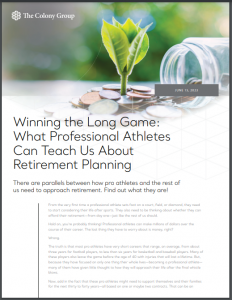Winning the Long Game: What Professional Athletes Can Teach Us About Retirement Planning
From the very first time a professional athlete sets foot on a court, field, or diamond, they need to start considering their life after sports. They also need to be thinking about whether they can afford their retirement—from day one—just like the rest of us should.
Hold on, you’re probably thinking! Professional athletes can make millions of dollars over the course of their career. The last thing they have to worry about is money, right?
Wrong.
The truth is that most pro athletes have very short careers that range, on average, from about three years for football players, to less than six years for basketball and baseball players. Many of these players also leave the game before the age of 40 with injuries that will last a lifetime. But, because they have focused on only one thing their whole lives—becoming a professional athlete—many of them have given little thought to how they will approach their life after the final whistle blows.
Now, add in the fact that these pro athletes might need to support themselves and their families for the next thirty to forty years—all based on one or maybe two contracts. That can be an extremely difficult adjustment for players to make. Case in point: nearly 78% of NFL players go broke within two years of retiring from the game while 60% of NBA players face financial crisis within five years of playing their last game.1
That’s why pro athletes need to have well-defined goals and a financial plan that covers their playing career, as well as their post-playing days, right from the start. Like a professional athlete, it’s about putting yourself in a position to win the long game.
Too often, we wait until the twilight of our own professional career to think about our financial goals for retirement, as well as what our lives will look like at retirement. By then, it might be too late.
Financial Success Doesn’t Happen By Accident
Everyone wants lifelong financial security. But it takes years of well-planned actions, continuous monitoring, and lots of discipline to accomplish your long-term financial goals. It doesn’t happen by itself!
That’s why there are many parallels between how pro athletes and the rest of us, their fans, need to approach retirement right from the start of our careers. Sure, the stakes and timeframes might be different. But I can tell you that, as a financial advisor who has advised both pro athletes and working professionals over the course of my thirty-plus-year career, the principles are very similar. It all starts with having a well-defined game plan that is both realistic and adaptable. No doubt, you will all face a few challenges along the way.
Creating a Detailed Retirement Roadmap
While the timeframe for retirement planning might be compressed into just a few years for a pro athlete, many of the same principles and advice applies to the rest of us at different stages in our careers.
In both cases, it can help to have a financial advisor, or even a team of advisors, assist you with developing the best possible game plan together. A financial advisor is like a trained coach—someone who can help educate and guide you and create a realistic game plan with detailed action steps to maximize your chances of success. Like a resourceful coach, they can also serve as a sounding board and source of honest feedback to help you make the adjustments needed to plan for contingencies, so you can be prepared to win the long game over the course of your entire career and retirement.
LEVEL ONE: First Pro Contract—Someone Starting Out in the Workforce
Whether you start your career as an athlete or as a young professional, your first step should be to set a realistic budget that will cover all of your expenses – after taxes – with some emergency cash reserves set aside.
While it can be tempting to spend money you’re now earning, set reasonable limits based on what you can truly afford. Now is the time when you should begin building a strong credit history by paying off credit cards mortgage and other debts on a timely basis.
It’s also the time to start saving on a regular basis, especially in your qualified retirement plan. Invest as much and as early as possible. Money grows on money by compounding each year! For example, if you invested $1,000 per month for 40 years (i.e., $480,000 in total), your portfolio’s future value -assuming a 6% annualized rate of return and no fees or taxes – would be nearly$2 million. Make compounding your new best friend! Too often, we get derailed by saving too little, too late.
LEVEL TWO: Second Pro Contract—A Mid-career Professional in their earning prime
Congratulations—you’ve made it to the prime time! As an athlete, you’ve played well enough and long enough to earn your second contract—which might also be your last contract. As a professional, you’ve climbed the ranks of your chosen field and are now finally making some real money.
The mistake so many athletes and professionals make at this stage of their lives is getting caught up in what we might call, “keeping up with the Jones’”by upgrading to bigger houses, nicer cars, a country club, private schools for your kids, lavish vacations…a lifestyle that can become saddled with debt and increasingly expensive to maintain in the future, if not kept in check.
What you have to remember is that you still need a budget that balances your household expenses with the money needed for your long-term savings plan, kids’ college tuition, insurance needs and unexpected family contingencies. There are many competing goals for your limited dollars. Having a detailed financial plan that covers your cash flow, risk management, asset accumulation and estate planning is critical.
As you move through your prime earning years, make sure you have enough life and disability insurance to replace any lost earnings and adequate cash reserves to support your family. This is also a time to pay off any debt. Consider long-term care insurance options for yourself and your spouse; if you’re an athlete, you may even want to consider long-term care insurance for family members you may be supporting when you retire.
When it comes to building your investment portfolio, take the time to establish a target asset allocation that combines multiple asset classes based on your specific investment goals, risk tolerance and time horizon. Many people make the mistake of investing too conservatively too early in life, forgetting that their retirement portfolio needs to continue to grow and support them for another 40 years.
Even the best investment minds can’t time the market so don’t forget to rebalance your portfolio regularly. Working with a financial advisor can help educate you about different types of investments and risks and keep you on track, especially during volatile and bearish markets, which are sure to happen over time.
LEVEL THREE: Third Pro Contract—Late Career Professional
You’ve now reached the fourth quarter of your athletic or professional career. It’s time to take stock of your retirement plan and see where you might need to make any final adjustments. Having a clear financial picture can help ease your transition into retirement.
One resource we have created to help with pre-retirement planning at least five years prior to actual retirement is called the Fearless Financial Plan for Retirement, which includes a checklist of action items such as:
- Put structure around your future retirement goals – Identify where to live; to work or not; new activities.
- Update your Net Worth Statement – Review assets to sell and debts to pay off.
- Review your taxable and retirement portfolios – Do holdings need to be rebalanced due to risk? Are they liquid enough?
- Track your actual spending for a full year – You need a complete and honest assessment.
- Create a target retirement budget – Don’t underestimate your expenses at retirement, especially for rising health care costs and any ongoing family commitments.
- Review your social security and other pension benefits as well as timing and filing options.
If the calculated probability of success is high, say 85%, then your financial plan is likely on track. If your probability of success is significantly lower than 85%, you may want to consider revisions to your retirement plan so you don’t run out of money.
Even families with high net worths are at risk of running short if they haven’t taken the steps to review models of their sustainable retirement cash flow using their actual financial inputs. Retirement plans need to be stress-tested on a regular basis to account for the latest changes in one’s net worth, lifestyle circumstances and the markets to make appropriate adjustments for future withdrawal distributions. Your financial plan should also consider survivorship issues and financial scenarios for the surviving partner.
It’s more than just money. You need a vision.
It’s important to be thinking beyond just the financial implications of making your retirement transition. What do you want your life to look like once the daily routines of the practice field or the office ends? It’s easy for newly retired athletes and professionals alike to suddenly feel lost if you haven’t thought ahead and asked yourself tough questions like: What are you going to do with all of your newfound free time? How is your spouse, partner, or family going to react to having you around a lot more? Do you have hobbies or other interests you’d like to explore, or perhaps, even embark on an entirely new career or start a business? Maybe you want to become coach or mentor and work with young people in your field?
The opportunities to reinvent yourself are endless—but it can also be overwhelming if you haven’t planned ahead. Working with a transition coach can help you think through these important questions while also helping you identify new opportunities that might be available based on leveraging your name, expertise and relationships you have cultivated throughout the course of your career.
LEVEL FOUR: Post-career- Retirement
You won! You made it to retirement. You can now look back on your career—regardless of how long it was—with pride at what you accomplished. Because of all your disciplined planning, you’re now able to enjoy the life you envisioned beyond your playing or professional days.
Even if all the work you did with your advisors about gaining clarity on your finances has paid off, you still need to regularly review your financial situation and income sources—as well as your housing and health expenses—to make sure everything is in check.
If you haven’t done a comprehensive estate plan (or updated it recently), this is a good time to sit down with an estate attorney to ensure that your family and heirs understand your final wishes and your legal documents are current. Too often, we hear how celebrities (think Prince and Aretha) die without a will, leaving families at great risk during their most vulnerable time.
Regardless of how old you are—maybe 40 or maybe 65—you’re now able to live a life others might envy. While they might say you were lucky, you know better. You earned this life. This is what winning the long game is all about.
1 Pablo S. Torre, “How (And Why) Athletes Go Broke,” Sports Illustrated.


